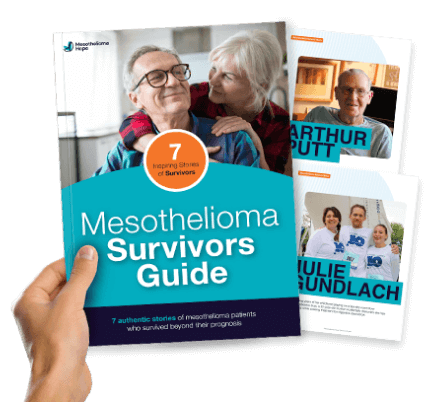Being diagnosed with mesothelioma can bring a flood of emotions, from fear and anxiety to uncertainty about the future. If you or someone close to you is facing this devastating disease, it’s normal to feel overwhelmed — but you don’t have to do this alone.
We’ve gathered some of the most impactful and life-changing advice from mesothelioma survivors, their loved ones, and trusted medical professionals.
Here are 9 tips to help improve your prognosis and maintain your quality of life with mesothelioma.
Tip #1: Get a Second Opinion
Because mesothelioma is so rare and shares symptoms with more common illnesses, it’s often mistaken as something less serious, like the flu, pneumonia, or even gastrointestinal issues.

“The majority of patients end up getting misdiagnosed or treated for a number of other things before it gets figured out.”
Peritoneal mesothelioma survivor Mary Jane Williams visited her doctor to discuss abdominal bloating and weight loss. Unfortunately, she was misdiagnosed and prescribed medication for gastroesophageal reflux disease (GERD).
“Most doctors don’t see mesothelioma, so they don’t know what to look for,” Mary Jane warned. “So if you’re not happy with the doctor, then you go to someone else. You keep going until they find out what it is.”
Asking for a second opinion could confirm your original diagnosis or reveal a different health issue altogether. Either way, you’ll gain peace of mind from knowing you’re getting the right treatment.
Read more mesothelioma tips in our Free Survivors Guide, shipped to your door overnight.
Tip #2: Find a Mesothelioma Specialist
Seeing a doctor who’s treated multiple cases of mesothelioma is critical to receiving the right care. A general oncologist may not have the in-depth knowledge and experience of a mesothelioma doctor.

“When we got the diagnosis of mesothelioma, the doctor was shocked, I was shocked, everyone was shocked. Right away, the doctor said, ‘I’ve never seen this before, and I’ll probably never see it again. We need to get you to a specialist.’”
Mesothelioma specialist Dr. Hedy Lee Kindler puts it simply: “Mesothelioma isn’t lung cancer. To understand the subtleties of it, you need an expert. Especially at the beginning, it’s important to have someone who is comfortable with the disease — a quarterback who understands all the options out there.”
Mesothelioma Hope has built relationships with trusted health care partners and top doctors nationwide. Contact our Patient Advocates at (866) 608-8933 to find a mesothelioma specialist near you.
Tip #3: Pursue Palliative Care ASAP
Mesothelioma palliative care takes a comprehensive approach to support your physical, emotional, and mental well-being throughout treatment.
Starting palliative care early can lead to:
- Better coordination of holistic care
- Effective management of treatment side effects
- Enhanced quality of life
- Greater control over symptoms
- Improved emotional well-being
“We’ve found that early palliative care involvement is linked to patients having a better quality of life — period, full stop,” said Dr. Jacob Strand, a palliative care specialist at Mayo Clinic.
Tip #4: Be Your Own Biggest Advocate
While your doctor may have your best interests in mind, you should trust your instincts as well. Researching, asking questions, and advocating for yourself or your loved one can help ensure they get the right care.
When stage producer Jimmy Johnson was diagnosed with pleural mesothelioma, his wife Kelley gave up her life’s calling — traveling with bands and putting on rock shows — to become his caregiver and advocate.

“Advocacy is more important than caregiving, because if you don’t know your stuff and learn for yourself, you’re going to be at wit’s end.”
Now, doctors recognize her as she walks Jimmy to his appointments. “I’ve got 18 binders,” she jokingly confessed. “My gift is organization anyway. My job is logistics.”
At Mesothelioma Hope, our goal is to be that reliable, knowledgeable presence for you, guiding you through the complexities of treatment and helping you make informed decisions.
“Following treatment, I was challenged with many long-term side effects. I had to become my own best advocate,” said Jenna Tozzi, RN, our Chief Patient Care Advisor, who was diagnosed with a rare disease as a teenager.
Tip #5: Look Into New Treatments & Clinical Trials
Innovation is happening every day in the world of mesothelioma treatment, with some of the largest gains occurring within just the last few years. Every day, hundreds of medical doctors and researchers conduct mesothelioma clinical trials to test new treatments and get them approved for widespread use.
Treatments in clinical trials are provided at no cost and can help patients live longer with fewer symptoms. In October 2020, immunotherapy was approved as a first-line treatment for pleural mesothelioma after positive outcomes for patients in multiple clinical trials.
“As we learn more and more about these diseases — how they start, identifying them on a genetic level, and profiling patients and categorizing and personalizing their care — we can impact patients more directly,” says Dr. Daniel Labow, another mesothelioma specialist.
Tip #6: Manage Your Nutritional Needs
Mesothelioma treatments may cause side effects such as dry mouth, fatigue, loss of appetite or taste, and nausea. All of these can make it harder to get the nutrients you need.
However, proper diet and nutrition have been medically linked to a range of critical health functions, helping the body to heal itself and recover from medical procedures.
Good nutrition can help you:
- Better tolerate the side effects of treatment
- Have more energy and feel less tired
- Heal faster from surgery
- Keep your weight steady
- Feel strong enough to withstand treatment
- Sleep better and stay more positive
A pleural mesothelioma survivor since 2018, Arthur “Art” Putt underwent chemotherapy, which irritated his esophagus. His wife and daughter, both nurses, decided to feed him a medicinal blend of immune-boosting ingredients.
“At one time, doctors told me I’d never eat solid food again,” Art reflects, “but we showed them wrong.” After weeks of receiving this mixture through his feeding tube, Art felt healthy enough to eat solid foods again.
Get our Free Survivors Guide to read the rest of Art’s story and get nutrition tips from our mesothelioma nurse.
Tip #7: Prioritize Your Mental Health
About 25% of cancer patients experience symptoms of depression, according to the National Cancer Institute. The overwhelming nature of a cancer diagnosis can cause feelings of anxiety, anger, and fear. Therapy and emotional support can equip you with tools to manage these feelings and find peace.
“I did feel that the psychologist’s sessions were useful. I would recommend it because they give you coping strategies and things like that,” said Freya, a mesothelioma patient surveyed in a recent mental health study.
You can get additional support by:
- Engaging in approved physical activity. Low-impact exercises such as walking, biking, and yoga can help reduce symptoms of anxiety and depression.
- Seeking faith-based support. Studies have shown that participation in spiritual or religious activities can help cancer patients in a variety of ways.
When you feel low, remember there are people here to love and support you.



“There is no cure for mesothelioma. But there are things that make it better. And in our situation, it is our support team, our friends, and our church.”
Tip #8: Connect With a Support Group
Joining a mesothelioma support group — whether online or in person — connects you with others who truly understand your journey.
After being diagnosed with peritoneal mesothelioma, Mary Jane discovered her calling in serving as a mentor, accompanying other patients to their chemotherapy sessions and brightening their spirits. “I love going for these people,” Mary Jane said. “We’re all family. We are truly family. We can’t wait to see each other.”


“The truth is that the only people who genuinely understand what you are going through are those who have experienced it themselves.”
Being part of a community allows you to lift each other up, often without even realizing it. For those facing a mesothelioma diagnosis, sharing the journey with others can bring a profound sense of relief and support.
Tip #9: Seek Financial Compensation
Talking about money can make a lot of us uncomfortable, but the reality is that good medical care is expensive, especially the cost of treating rare cancers like mesothelioma.
You may be able to access mesothelioma compensation for treatment from a legal claim. Many mesothelioma survivors stress that the money they got by taking legal action was what allowed them to afford treatment.
“Month by month, we had to make more loans. We spent all of our savings and all of the IRA, so we were busy looking for more ways to find money for treatment,” said pleural mesothelioma survivor Dr. Bonnie Snyder. “And if we hadn’t gotten the settlement, we probably would not still be living where we are today.”
For pleural mesothelioma survivor David Rosedale, filing a legal claim also meant providing for his family. “I decided to pursue a mesothelioma lawsuit because I needed to provide for my family, and I was not going to be able to work,” he explained. “And without the compensation, you’re pretty well lost.”


“The results take away the monetary concerns that are associated with cancer, which is treatment and transportation and meeting your everyday bills. You can concentrate more on treatment and your family than you would if you didn’t have it.”
Contact Mesothelioma Hope for Support
At Mesothelioma Hope, each member of our team understands what you’re going through. Our Patient Advocates are here to support patients, their loved ones, and caregivers in any way we can.
We can help you:
- Connect with leading cancer specialists
- Understand the pros and cons of various treatments
- Manage uncomfortable symptoms and side effects
- Pursue compensation for the expenses that insurance doesn’t cover
Contact us today to get started. We’re happy to answer any of your questions, and it’s always free to speak with us.











